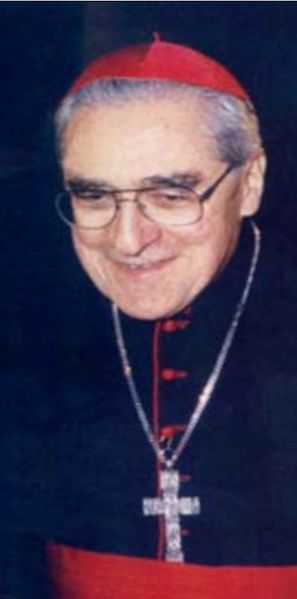The hit of this year’s Hartford Jewish Film Festival was “The Jewish Cardinal,” a French TV biopic about Aaron Jean-Marie Lustiger, the Jewish convert who served as archbishop of Paris from 1981 until 2005. It was the opening night presentation last Thursday, and played to sold-out crowds in two theaters Saturday evening.
No question, Lustiger’s life was remarkable. The son of immigrants who had left Poland for France around World War I, he found himself strongly attracted to Christianity as a boy, and was baptized into the Catholic Church by the Bishop of Orléans in 1940. With his sister (who also converted) and father, he fled to unoccupied southern France, while his mother returned to Paris to run the family hosiery shop. In 1942, she was deported to Auschwitz, where she died the following year.
After the war, Lustiger went into the priesthood, and spent a couple of decades involved with university chaplaincy at the Sorbonne. In 1979, he was appointed bishop of Orléans by Pope John Paul II, who had a special fondness for a fellow Polish ex-pat with whom he could speak Yiddish. Promoted to the archdiocese of Paris less than two years later, Lustiger famously said:
I was born Jewish and so I remain, even if that is unacceptable for many. For me, the vocation of Israel is bringing light to the goyim. That is my hope and I believe that Christianity is the means for achieving it.
The film focuses on the complexity of this hybrid identity, which is better conveyed by its French title, “God’s Crossbreed” (“Le Métis de Dieu). It was indeed unacceptable to many — including to traditionalist Catholics, some leaders of the French Jewish community, and not least to Lustiger’s father, a non-observant Jew who nonetheless saw his son’s conversion as a betrayal.
Theologically, Lustiger (who died in 2007) was very much down with the conservative program of John Paul, a circumstance that alienated him from most other French bishops and which the film glosses over. But he was not shy about standing up for the Jews, most notably when it came to the Carmelite nuns who set up shop in Auschwitz in the mid-80s. To be sure, 80,000 Poles died in the camp along with the 1.1 million Jews, and the nuns were about the business of praying for everyone. But the optics were not good, and (in the film’s portrayal) once Lustiger realized it, he persuaded his landsman Karol to get them out of there.
Despite this satisfying denouement, I left the film wondering a bit at my co-religionists’ warm embrace of “The Jewish Cardinal.” Lustiger’s Christian-Jewish identity remains an awkward thing, and you come away thinking that he’s never become entirely comfortable in his own skin. Yet, as we make our way into the new century, hybrid religious identities are increasingly common — and, I guess, increasingly acceptable even to Jews of a certain age in Connecticut.






